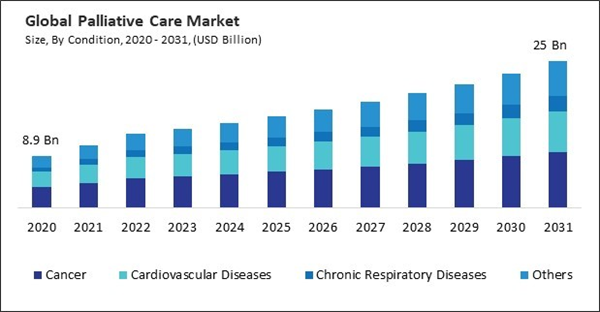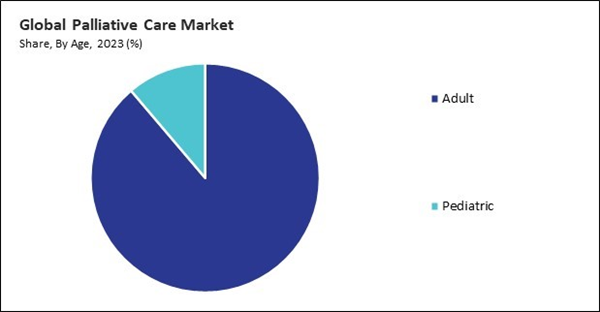As per the World Health Organization, 80% of senior citizens will live in low-and middle-income countries by 2050. The aging of the population is happening more quickly than in the past. In 2020, the population of people 60 years of age and over exceeded the population of children under five. Therefore, the Pediatric segment registered $1,522.1 million revenue in the market in 2023. As populations age, there is a natural increase in chronic and life-limiting illnesses. Aging is associated with a higher risk of developing conditions such as cancer, cardiovascular diseases, respiratory disorders, and neurodegenerative conditions like Alzheimer's disease. Chronic illnesses frequently manifest with intricate symptom profiles and have the potential to affect an individual's overall well-being profoundly.
To optimize symptom management, mitigate distress, and enhance the general well-being of patients and their families, palliative care has become an integral element of patient-centered care strategies, emphasizing improving quality of life and alleviating suffering. patient-centered palliative care prioritizes individualized approaches to care tailored to each patient's unique needs and circumstances. Additionally, As the demand for palliative care services continues to rise globally, there is a pressing need for a well-trained and skilled workforce capable of delivering high-quality care to individuals facing serious illnesses and end-of-life issues. Therefore, these factors can help in the expansion of the palliative care market.
Furthermore, With the surge in COVID-19 cases, there was a heightened demand for palliative care services to support patients with severe illness, particularly those requiring intensive care and end-of-life care. Palliative care teams were paramount in attending to the intricate requirements of COVID-19 patients by delivering end-of-life care, symptom management, and emotional support. Thus, the COVID-19 pandemic had a significant impact on the palliative care market.
However, Licensure requirements for palliative care facilities vary by jurisdiction but typically involve obtaining licenses or permits from regulatory agencies to operate legally. These requirements may include demonstrating compliance with specific standards related to staffing, physical facilities, patient care protocols, and infection control measures. Hence, owing to these aspects, there can be reduced demand in the market.
By Age Analysis
On the basis of age group, the market is bifurcated into adult and pediatric. In 2023, the adult segment captured nearly 90% revenue share in the market. The aging population worldwide has contributed to the increased demand for palliative care among adults. Therefore, these factors can lead to increased demand in the segment.By Condition Analysis
Based on condition, the market is segmented into cardiovascular diseases, cancer, chronic respiratory diseases, and others. The cardiovascular diseases segment held more than 1/4th revenue share in the market in 2023. As the population ages and the prevalence of risk factors including hypertension, diabetes, and obesity increases, the financial impact of cardiovascular diseases (CVDs) persists. Hence, these factors can assist in the growth of the segment.By Provider Analysis
Based on provider, the market is divided into hospitals & clinics, nursing homes, and others. The hospitals and clinics segment recorded more than 2/5th revenue share in the market in 2023. There has been a growing awareness and recognition of the importance of palliative care among healthcare providers, patients, and families. Hospitals and clinics have responded to this increased demand by expanding their palliative care programs and services to meet better the needs of patients facing serious illness.By Regional Analysis
By region, the market is segmented into North America, Europe, Asia Pacific, and LAMEA. The North America segment procured 2/5th revenue share in the market in 2023. In North America, healthcare providers, policymakers, and the general public have become increasingly cognizant of the advantages associated with palliative care. As a result, there has been increased adoption and integration of palliative care into mainstream healthcare services. Therefore, these factors will assist in the expansion of the segment.List of Key Companies Profiled
- Amedisys, Inc.
- Honor Technology Inc. (Home Instead, Inc.)
- Genesis Healthcare, Inc.
- Lifepoint Health, Inc. (Gentiva Health Services)
- VITAS Healthcare Corporation (Chemed Corporation)
- Sunrise Senior Living
- Fonthill House
- Baptist Health
Market Report Segmentation
By Age- Adult
- Pediatric
- Cancer
- Cardiovascular Diseases
- Chronic Respiratory Diseases
- Others
- Hospitals & Clinics
- Nursing Homes
- Others
- North America
- US
- Canada
- Mexico
- Rest of North America
- Europe
- Germany
- UK
- France
- Russia
- Spain
- Italy
- Rest of Europe
- Asia Pacific
- China
- Japan
- India
- South Korea
- Singapore
- Malaysia
- Rest of Asia Pacific
- LAMEA
- Brazil
- Argentina
- UAE
- Saudi Arabia
- South Africa
- Nigeria
- Rest of LAMEA
Table of Contents
Companies Mentioned
- Amedisys, Inc.
- Honor Technology Inc. (Home Instead, Inc.)
- Genesis Healthcare, Inc.
- Lifepoint Health, Inc. (Gentiva Health Services)
- VITAS Healthcare Corporation (Chemed Corporation)
- Sunrise Senior Living
- Fonthill House
- Baptist Health










